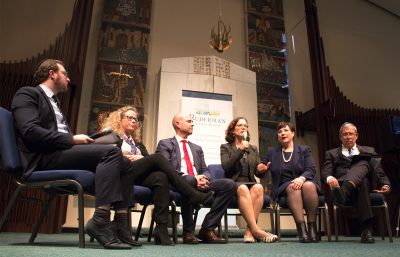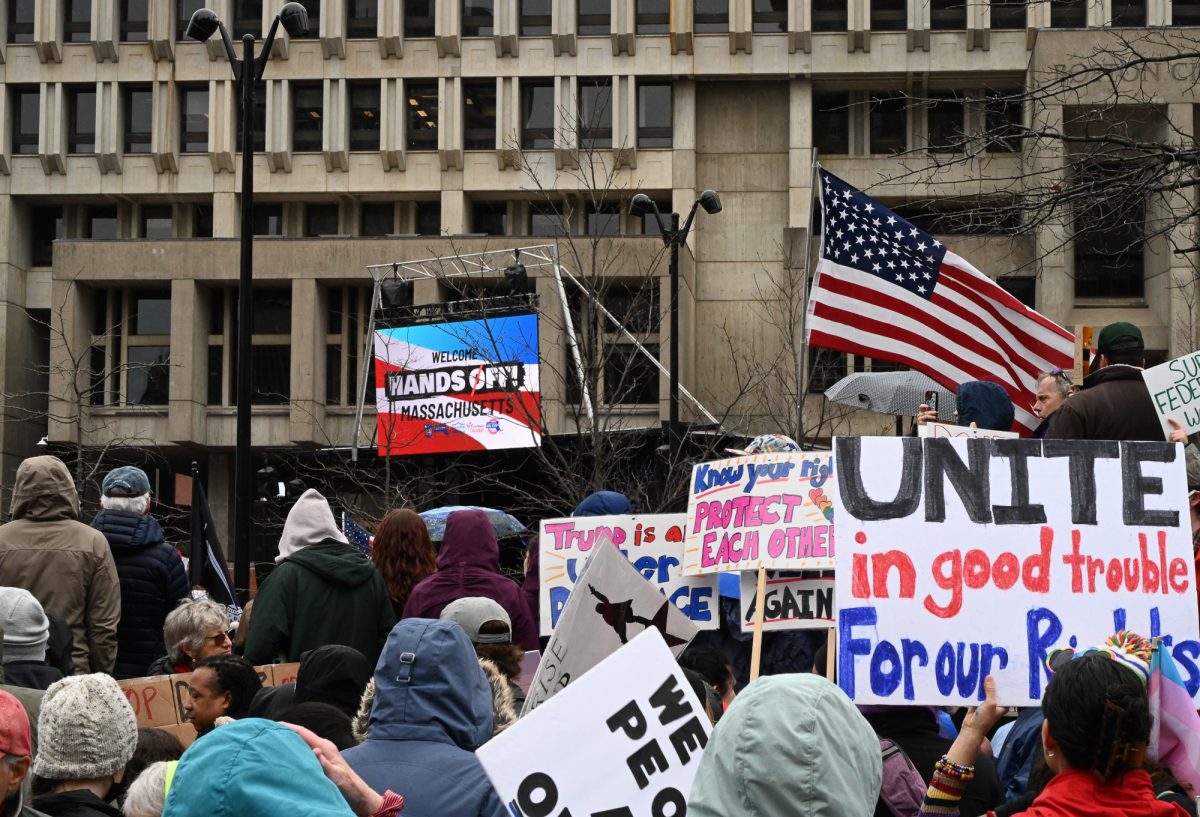
Five members of the Israeli Knesset, the country’s national legislature, participated in a public town hall meeting in Boston that drew about 300 audience members to Congregation Kehillath Israel on Wednesday night.
The Ruderman Family Foundation organized the meeting as part of the Ruderman Knesset Fellows Mission, the foundation’s Advocacy and Media Relations Manager Dvir Assouline said before the event. They bring Israeli Knesset members to the United States in an effort to bridge the gap between American and Israeli Jews.
“Hosting an event like this is a go-both-ways opportunity,” said Jasmine Gothelf, program officer at the Ruderman Family Foundation, before the meeting started. “One is … to give the people here an opportunity to be heard by Israeli elected officials. On the other hand, [it] is for people here to be able to hear from Israeli elected officials how they feel about issues that they care about.”
The Algemeiner’s Editor-in-Chief Dovid Efune moderated the question and answer session focused on the relationship between American and Israeli Jews. Afterwards, members of Knesset took questions from audience members.
Knesset member Amir Ohana talked about the Israeli political system and how it differs from that of the United States.
Ohana explained how, instead of the two-party system the United States has, multiple parties comprise the Knesset and none of which hold a majority. The smaller parties form coalitions with each other in order to form a majority and advance their initiatives.
Ohana is also the first openly gay person right-wing person in the Knesset. For the first time, under his party’s leadership, LGBTQ issues, including increased funding for social services, were included in Israel’s budget.
Ohana was the only representative from the Likud party, the party of current Israeli Prime Minister Benjamin Netanyahu. The other Knesset members represented various parties along the ideological scale.
Knesset members talked about the importance of understanding the complexity of the Israeli-Palestinian conflict. Knesset member Ayelet Nahmias-Verbin offered to organize conference calls and speak with those interested in educating themselves.
Ohana said college students, particularly those who participate in Israel Apartheid Week, should meet the Israeli Arabs in person who they claim to represent. The vast majority of Israeli Arabs would counter the apartheid claims, he said.
“I want to bring a group of 30, 40, maybe 50 Israeli Arabs to the campuses on Apartheid Week saying, ‘When you are talking about apartheid, you are talking about it on my behalf. Here I am,’” Ohana said.
Kulanu Knesset member Rachel Azaria recalled her legal advocacy in dismantling gender segregation. When she ran for Jerusalem City Council, an Orthodox community refused to put her picture on a bus advertisement. She brought the case to the Israeli Supreme Court, which sided with her, fueling her nationwide campaign to introduce legislation outlawing segregation.
Nahmias-Verbin spoke about women’s rights in Israel, stating three out of the five members present were female. Nahmias-Verbin, a member of the Zionist Union party, compared women’s rights advocacy in Israel to that of the United States.
She said although women’s rights in Israel continue to advance with time, they do not have the same separation of church and state that the United States does, which can bring unique challenges to women who are trying to advance in the workplace.
While discussing President Donald Trump’s administration, the Knesset members expressed gratitude toward the American government for its support of Israel. However, Nahmias-Verbin was skeptical about political advisor Jared Kushner’s qualifications in advising Trump on Middle Eastern policy.
“The situation in the Middle East is being held by Jared Kushner, who I’m not sure completely understands all the complexities,” Nahmias-Verbin said. “I’m from the business sector, OK? This is not just a merger you close. This is not just a straightforward deal that you close.”
Several people in the audience said bringing in representatives from Israel is helpful in facilitating America’s understanding of the Middle East and its conflicts.
Iftach Wizel, 48, of Brookline, said as an Israeli immigrant, he appreciated the Ruderman Foundation’s efforts to educate American and Israeli Jews about each other’s cultures.
“Strengthening the bond between Israel and the Jewish community in Boston is very important for both sides,” Wizel said.
Lila Sesholtz, 89, of Brookline, said as a Jew, she finds that many other American Jews are not as informed on Israel and Israeli Jews as they should be.
“I’m not so knowledgeable about the affairs of Israel,” she said. “I should be, so I thought I would come and see.”
Karyl Weicher, 65, of Sharon, an American-Israeli dual citizen, said she thinks engaging Israeli and American Jews, two groups separated by a vast distance, can help dispel misconceptions the two groups hold about each other.
“[It is] a wonderful idea to get the [members of the Knesset] to understand what the American Jewish community is like,” Weicher said. “There are a lot of preconceived ideas of what the American Jewish community is [in Israel].”






















































































































